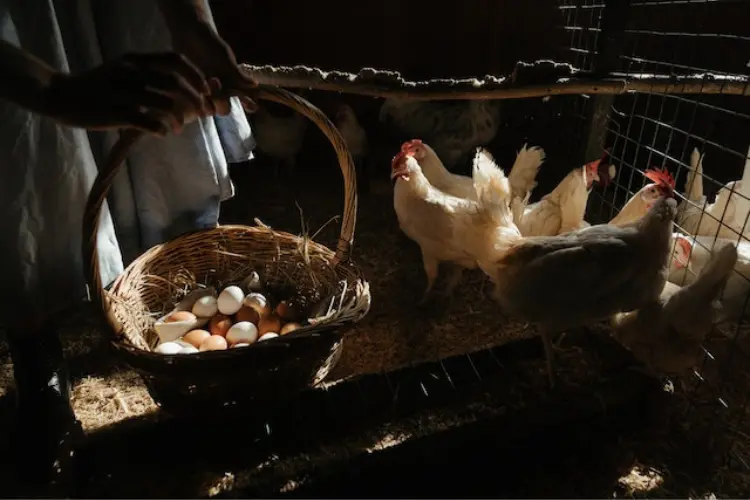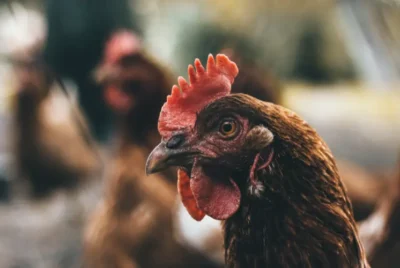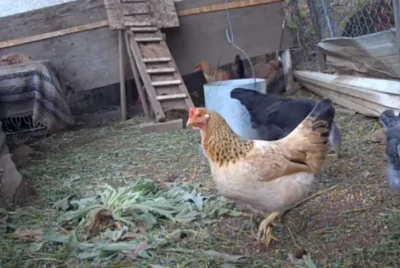10 Best Laying Chickens for Your Backyard (350 Eggs Per Year)
Imagine the joy of collecting fresh eggs every morning from your very own backyard chickens! With the right egg-laying chicken breeds, you can easily achieve self-sufficient egg production and enjoy the benefits of raising your own flock. In this blog post, I’ll introduce you to the top 10 best-laying chickens that can provide you with a consistent supply of delicious, nutritious eggs all year round.
Top Egg-Laying Chicken Breeds
Selecting the best egg-laying chicken breeds is a vital step when starting or expanding your backyard flock. Our detailed research has produced a list of the top 10 best chicken breeds ever, ideal for backyard flocks due to their high egg production. Let’s uncover more about these extraordinary egg layer champions!
1. Golden Comet
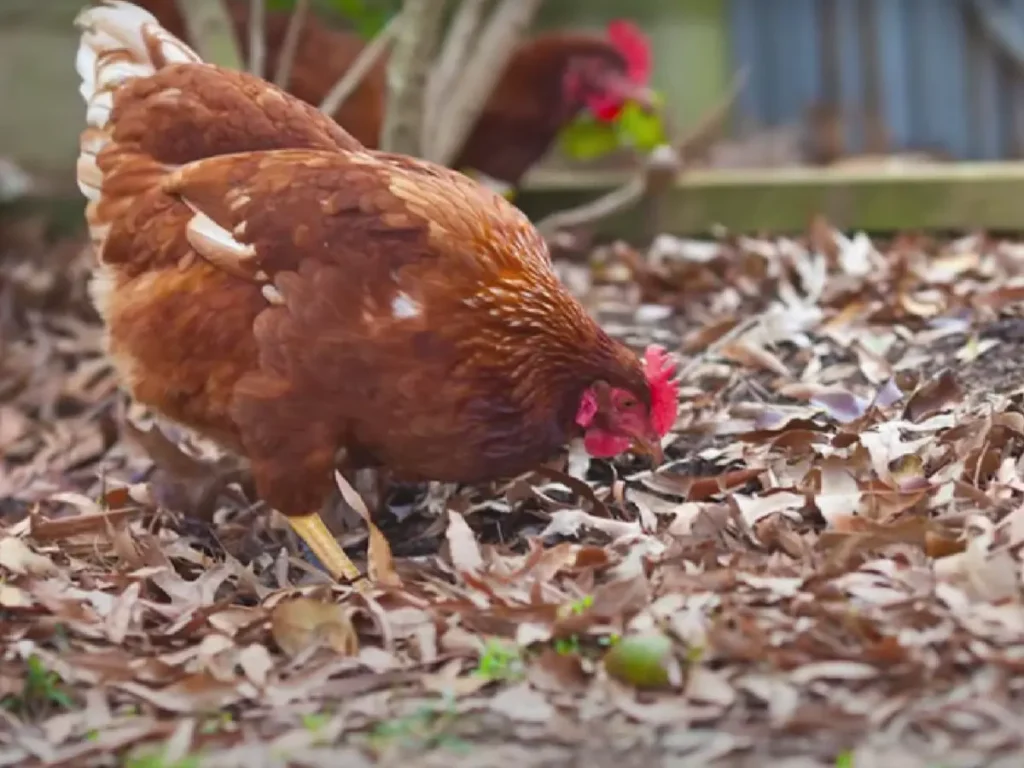
The Golden Comet stands out as a superior egg-laying chicken breed. It is a crossbreed of a New Hampshire Red rooster and White Rock hens. As a hybrid breed, Golden Comets are friendly, intelligent, and highly productive egg layers, laying an impressive 300-350 eggs per year.
Not only do Golden Comets lay a fantastic number of eggs, but they also consistently produce large brown eggs. Their ability to lay almost daily for the first two years makes them an excellent addition to your egg basket.
Golden Comets are a top choice among hybrid breeds known for their huge egg size and friendly nature.
2. Rhode Island Red
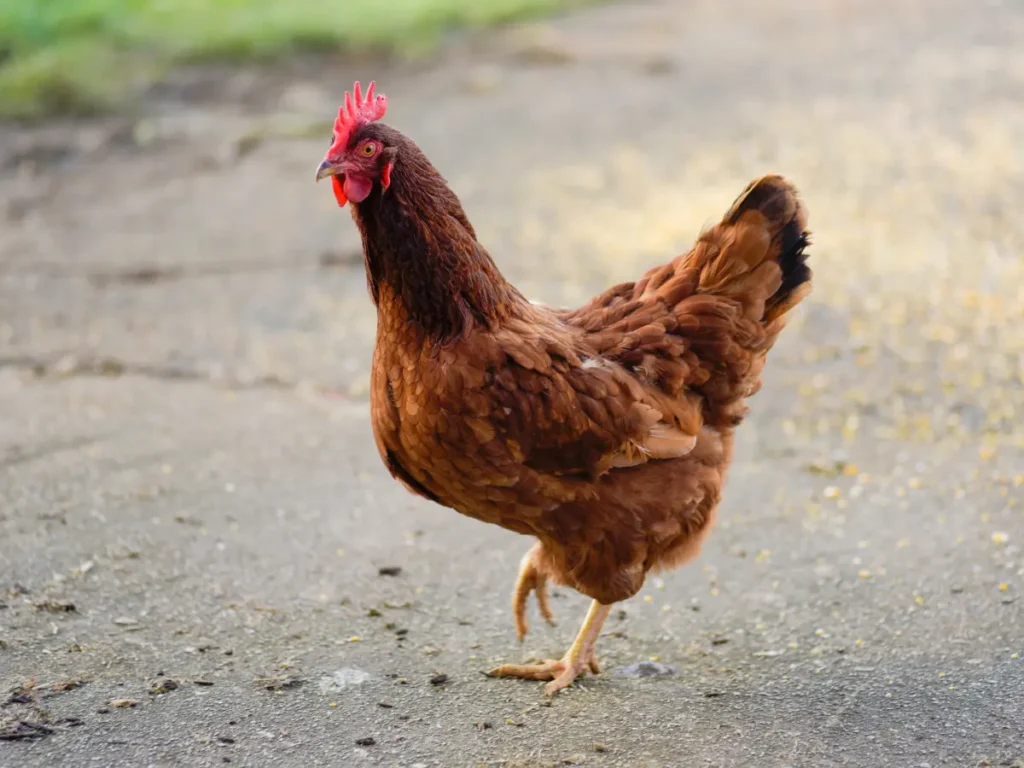
Rhode Island Red chickens are celebrated for their resilience, amicable nature, and notable egg-laying skills. These hardy birds are an excellent choice for backyard flocks, capable of producing up to 300 eggs per year. Rhode Island Reds typically start laying eggs at around 18-24 weeks of age.
Their dominant nature allows them to flourish in diverse environments, though sufficient space is crucial to prevent any bullying behavior. As a cold-hardy breed, Rhode Island Reds can maintain their egg-laying abilities even in colder climates, making them suitable for both meat and egg production.
3. Leghorn
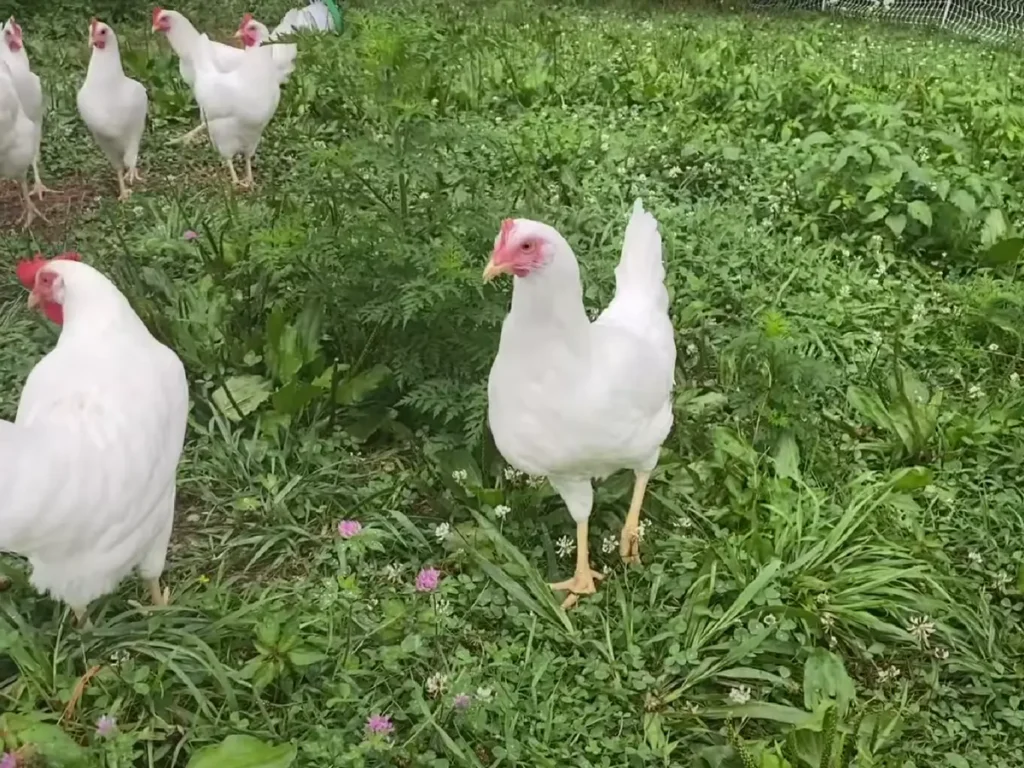
Leghorns, particularly the White Leghorn, are favored and dependable egg layers, celebrated for their commercial egg contribution. These chickens can produce an impressive 250-280 eggs per year, with some White Leghorns laying as many as 300-350 eggs yearly.
The White Leghorn holds the record for the most eggs laid in a year, making it an egg-laying superstar. Laying 4-6 large white eggs every week, White Leghorns are an excellent choice for experienced chicken keepers looking to maximize egg production.
You can also read our caring guide about the Pear Star Leghorn, another excellent variant of the Leghorn breed.
4. Plymouth Rock

The Plymouth Rock, a large and attractive breed, boasts a friendly temperament alongside consistent egg-laying capabilities. Laying 4-5 light brown eggs weekly for 2-3 years, Plymouth Rocks are an excellent addition to any backyard flock.
These best-laying chickens are known for being excellent foragers, devoted moms, and easy keepers, making them popular among backyard chickens keepers. Their huge egg size and impressive egg production rate of 200 eggs per year make them a great choice for those looking to start or expand their backyard flock.
5. Sussex
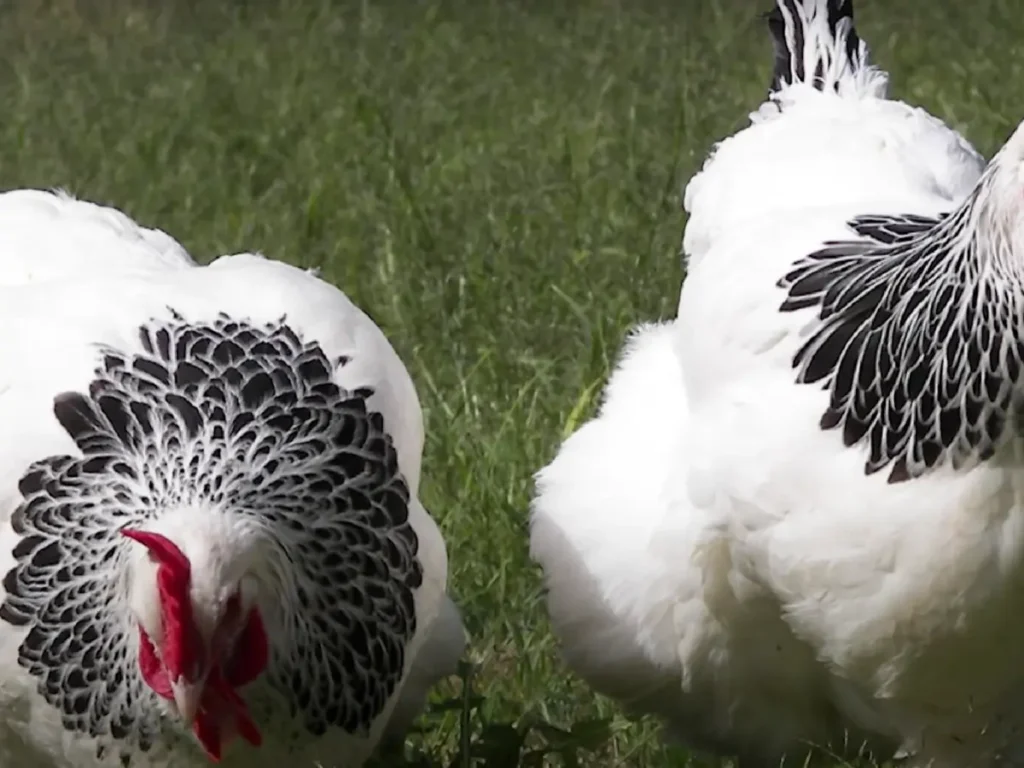
The Sussex chicken is a heavy and placid breed that is widely recognized for its impressive production of over 250 brown eggs each year. Not only are they renowned for their remarkable egg production, but they are also suitable for both egg and meat production because of their large size.
Moreover, their calm and tame nature makes them excellent companions in the garden. Typically, Sussex chickens begin to lay eggs at the age of 16-20 weeks. On average, they produce 4-5 large brown eggs weekly, solidifying their reputation as one of the top ten best egg-laying chicken breeds.
6. Australorp
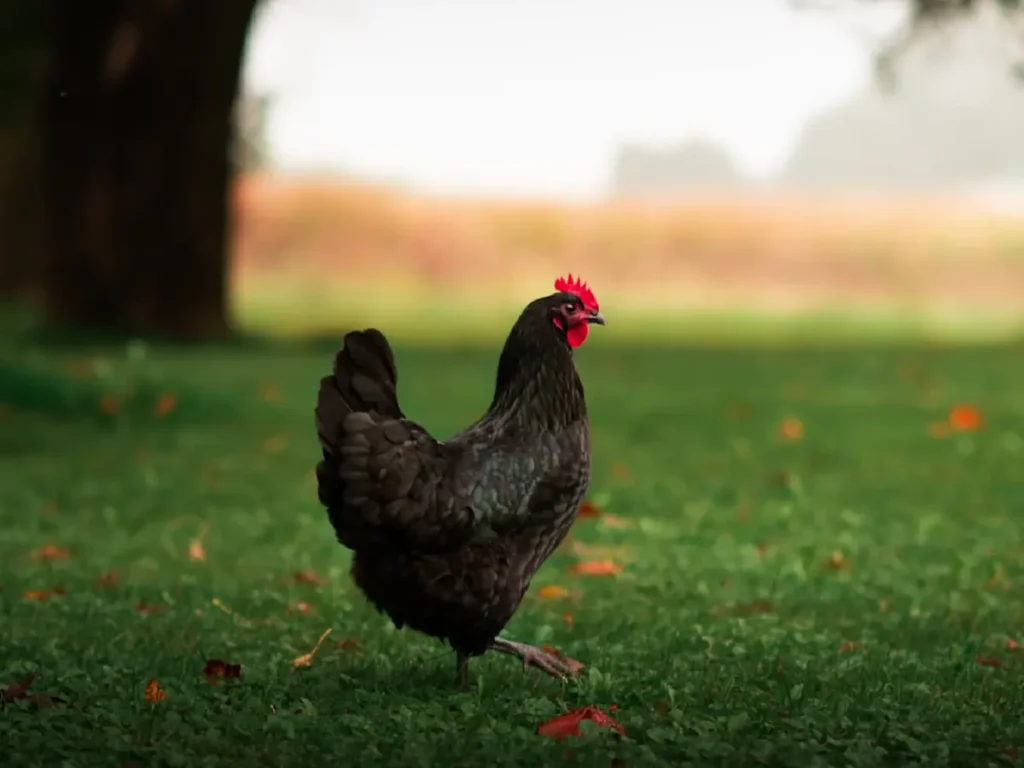
Australorps, quiet and timid birds, hold the world record for egg production with 364 eggs laid in 365 days. Although they may appear timid, their high egg production makes them an excellent choice for backyard flocks.
These birds lay around 4-5 light brown eggs per week, and their impressive egg-laying ability often continues for up to five or six years. Their gentle dispositions and long-term egg-laying abilities make them a top choice for backyard chicken keepers.
7. Buff Orpington
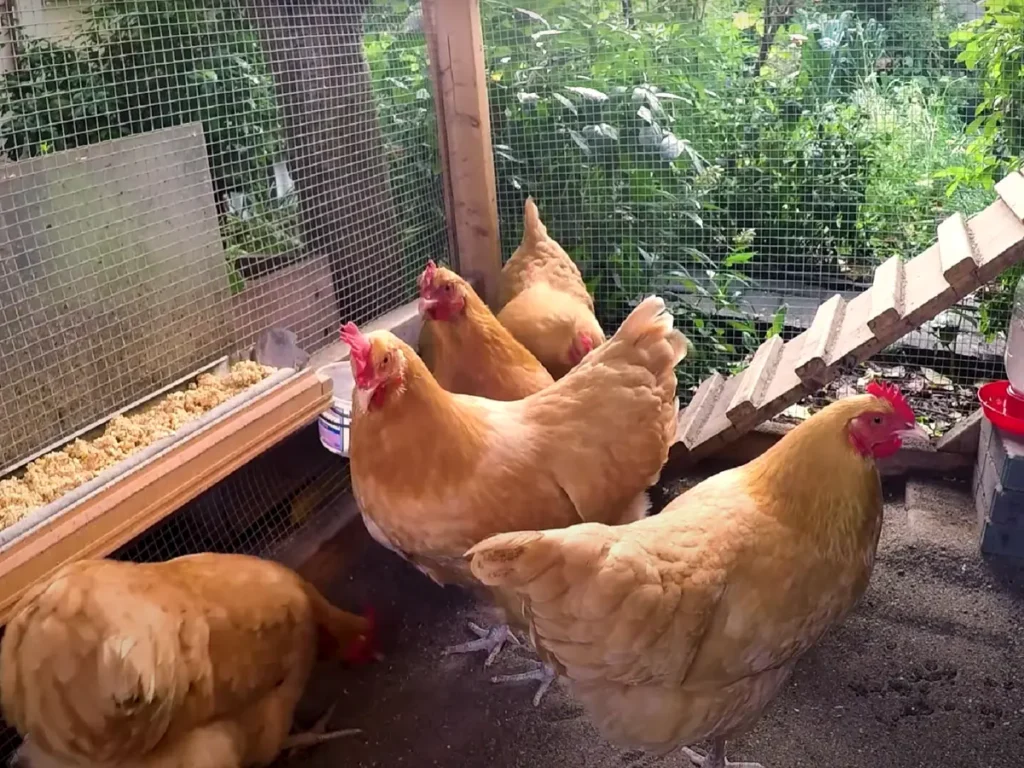
Buff Orpingtons are gentle birds that are perfectly suited to families, especially those with children. They lay light brown, medium-sized eggs 3-5 times a week and make wonderful garden companions. Furthermore, the utility strain of Buff Orpingtons comes highly recommended due to its excellent egg-laying abilities. In addition to their many desirable traits, these beautiful birds are also cold-hardy, making them adaptable to various climates and ideal for diverse backyard flock setups.
8. Easter Egger
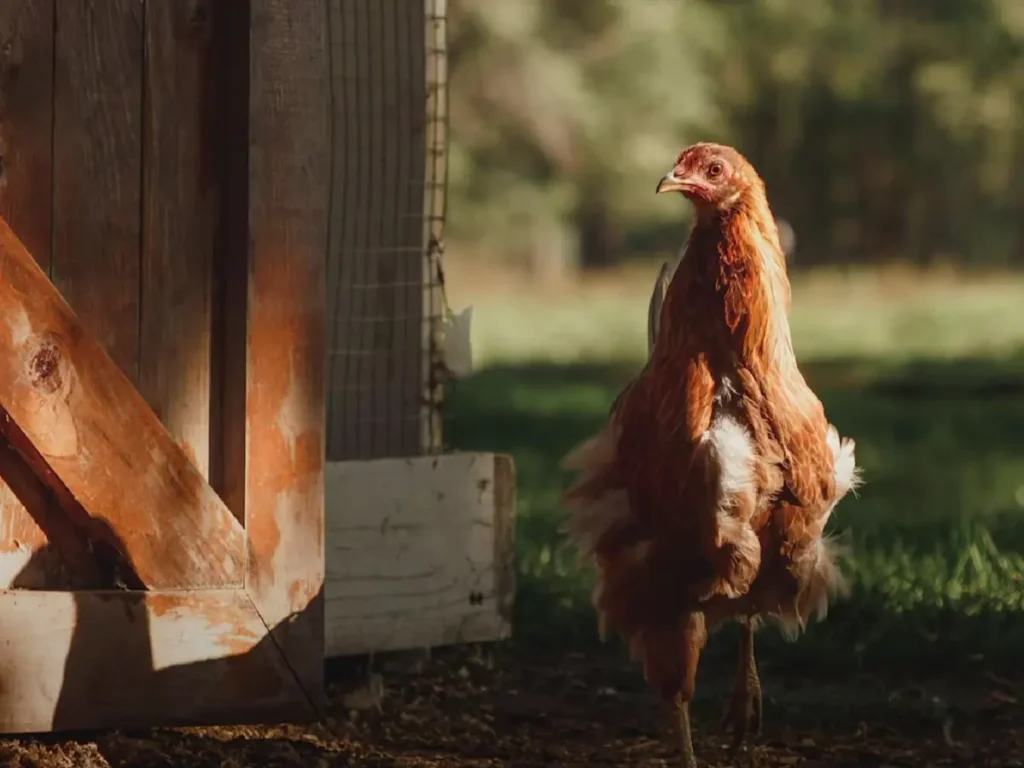
Easter Eggers, a unique hybrid breed, possess several distinct characteristics: they lay about four medium-sized eggs weekly, these eggs can range in colors from blue to pink, and they are not classified as a single breed but rather represent a variety of chickens that don’t conform to any established breed standard.
With their unique beards and strikingly colored eggs, they are often chosen for backyard flocks, enriching the egg basket with a spectrum of colors. These birds are not only a delightful addition to hatch eggs in any flock due to their varied egg hues but also provide fresh eggs and endless entertainment.
Read also our guide about Starlight Green Egger Profile.
9. Marans
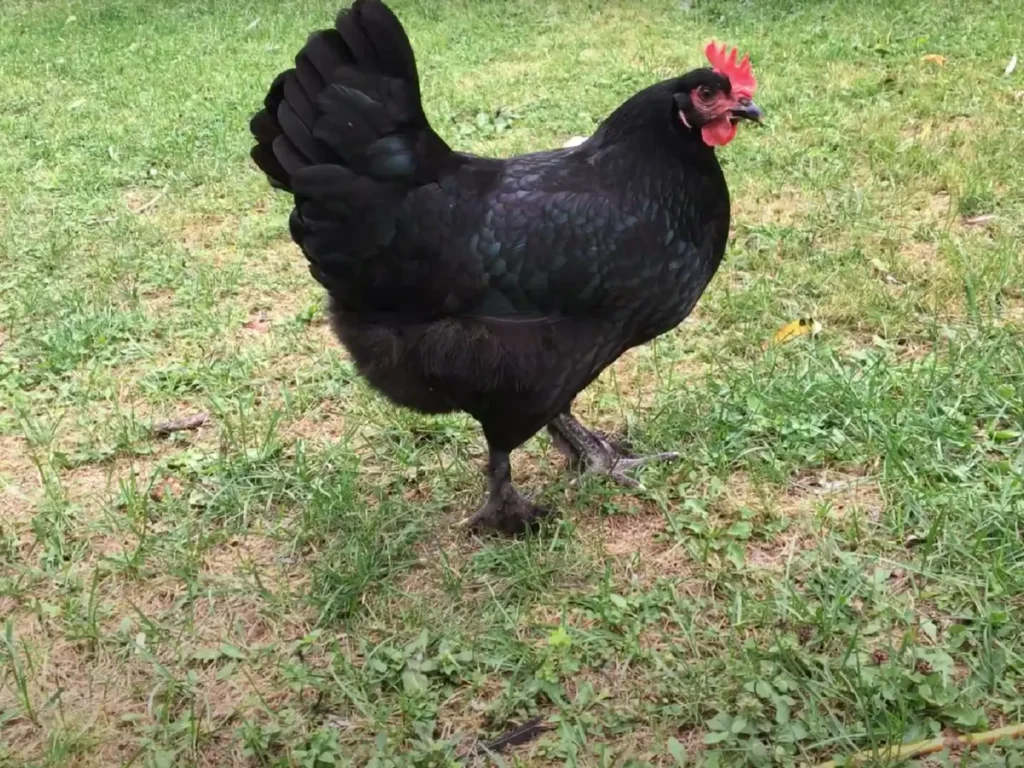
The Marans breed, a dual-purpose chicken, is recognized for its dark brown eggs and high-quality meat. These gentle and friendly birds are an excellent choice for both egg and meat production, providing a well-rounded addition to any backyard flock.
Marans lay an impressive 200 dark brown, medium-sized eggs per year. Their excellent meat quality and beautiful egg color make them a popular choice among backyard chicken keepers.
You can also check our detailed guide about Black Copper Marans.
10. Wyandotte
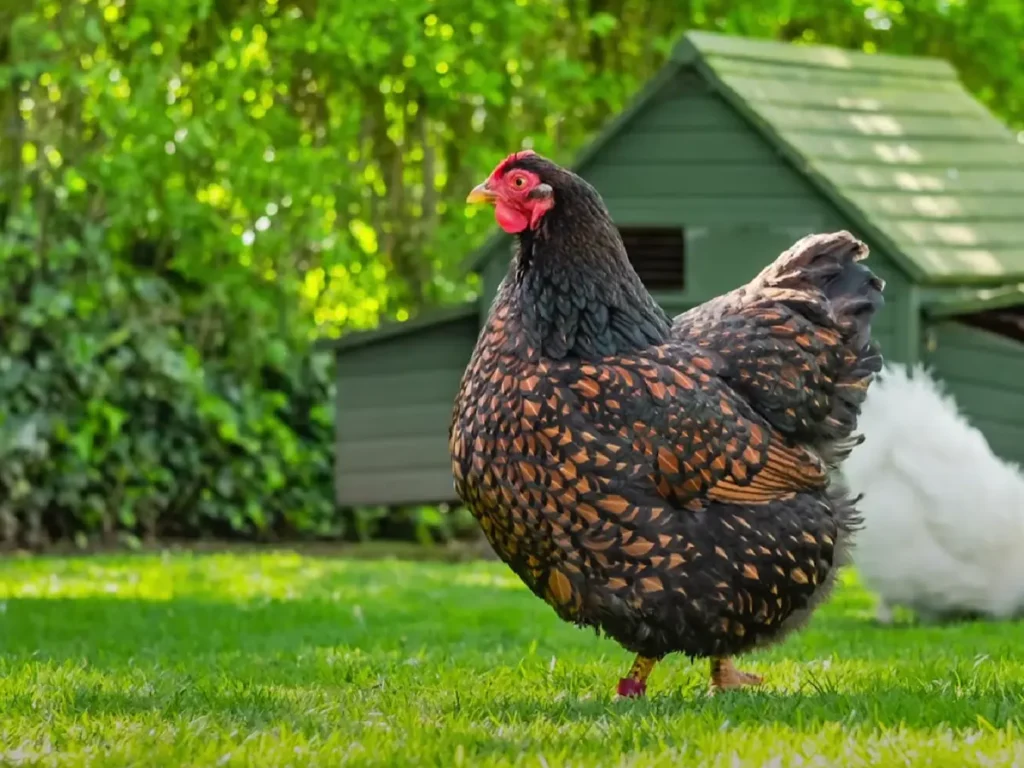
The Wyandotte is a breed specifically suited for cold weather, boasting a range of remarkable characteristics. Every week, they lay between 3 to 4 large eggs, tinted with shades of cream and brown. They are renowned for their stunning feather patterns, which only adds to their aesthetic appeal.
Not only are Wyandottes great egg layers, but they also serve as a beautiful addition to any backyard flock. What makes them especially noteworthy is their ability to maintain consistent egg-laying even in colder climates. Their blend of adaptability and striking appearance has cemented their popularity among backyard chicken enthusiasts across various regions.
Factors Influencing Egg Production
Several factors can influence a chicken’s egg production. Their age, diet, and daylight exposure all significantly impact their ability to consistently lay eggs.
Let’s delve deeper into these factors to grasp their impact on your backyard flock’s egg yield.
Age
The first year of a chicken’s life is the most productive for egg-laying, with a gradual decrease in productivity after three years. This means that younger chickens tend to lay more eggs, while older chickens may experience a decline in their egg-laying abilities. Understanding this factor can help you plan and manage your flock for consistent egg production.
Diet
A chicken’s diet significantly influences its egg-laying capabilities. Chickens require approximately 20 grams of protein daily for optimal health and egg production. Feeding your chickens a high-quality layer feed with the correct protein content is essential to ensure they have the nutrients they need to lay eggs consistently. Additional treats, such as mealworms, corn, scratch, and birdseed, can also contribute to a healthy and varied diet.
Daylight
Chickens need daylight to produce eggs, with a minimum of 14 hours for optimal egg laying. Providing adequate daylight is essential for consistent egg production, and you can achieve this by letting chickens out close to sunrise or using artificial lighting during shorter daylight hours.
Ensuring your egg-laying chickens, also known as laying hens, have enough daylight exposure will help maintain their egg-laying abilities throughout the year, which is an important aspect of raising chickens.
Chicken Coop Essentials
Establishing a safe and practical chicken coop is a critical factor in ensuring the wellbeing of your backyard flock. The perfect coop should provide the following:
Ample space
Proper ventilation
Adequate flooring and bedding materials
Nesting boxes
Roosts
Food and water containers
Temperature control equipment
Chicken toys for entertainment and mental stimulation
Providing adequate space allows your chickens to move around freely, promoting their overall health and wellbeing. Some essential features to include in your chicken coop are:
Proper ventilation to maintain a fresh and bacteria-free environment
Nesting boxes offer a secure place for your chickens to lay their eggs
Flooring and bedding materials for comfort
Roosts for your chickens to sleep on
Food and water containers for a clean and accessible supply of nourishment
Temperature control equipment to maintain a comfortable coop environment in various weather conditions.
By incorporating these features, you can ensure that your chickens have a safe and comfortable living space.
Treats and Supplements for Healthy Hens
Offering your chickens some free-range treats and supplements contributes to their health and happiness. Some nutritious and tasty treats for your chickens as part of their diet include:
Mealworms
Corn
Scratch
Bird seed
These treats not only provide variety in their diet but also contribute to their overall health and well-being.
In addition to treats, consider providing your chickens with supplements such as grit and oyster shells. Grit aids in digestion, while oyster shells provide a natural source of calcium for strong eggshells. Ensuring your chickens have access to these supplements, along with a balanced diet, will support their egg-laying abilities and overall health.
Heritage vs. Hybrid Breeds
Considering the differences between heritage and hybrid breeds is vital when choosing the best laying chicken breeds for your backyard flock. Heritage breeds have been around for a long time and are known for their hardiness and consistent egg production over a longer period (4-6 years). Hybrid breeds, on the other hand, are bred for specific traits such as outstanding egg production and tend to have a shorter productive lifespan but provide a generous amount of eggs upfront.
Both heritage and hybrid breeds offer unique advantages for egg production. Heritage breeds provide long-term egg production, while hybrid breeds offer more eggs in a shorter period. Depending on your individual needs and preferences, you may choose to mix and match breeds in your backyard flock to take advantage of both heritage and hybrid breed characteristics.
Best Cold-Hardy Chicken Breeds
For those in colder climates, selecting cold-hardy chicken breeds is key to sustaining consistent egg production. Cold-hardy breeds can thrive in cold climates and excel in egg production, even during the winter months. Some of the most impressive cold-hardy chicken breeds include:
Chantecler
Rhode Island Red
Buckeye
Australorp
Orpington
Plymouth Rock
Dominique
Welsummer
Light Brahma
Ameraucana
These cold-hardy breeds are not only great egg layers but also provide an excellent source of meat due to their larger size. When selecting the best laying chicken breeds for your backyard flock, considering your climate and choosing breeds that are well-suited to your region will ensure a happy and productive flock.
Which Chickens Lay Eggs the Longest?
When choosing the best-laying chicken breeds for your backyard flock, the longevity of egg-laying is a critical factor to consider. Most heritage breed chickens provide eggs for up to five or six years, making them a great choice for consistent egg production over an extended period.
Australorps, in particular, are renowned for their long-term egg-laying abilities. Often continuing to lay eggs for up to five or six years, Australorps are highly productive and have gentle temperaments. When looking for breeds that lay eggs for an extended period, Australorps come highly recommended.
Summary
Choosing the best laying chicken breeds for your backyard flock can provide you with a consistent supply of fresh, nutritious eggs all year round. By considering factors such as egg production, cold hardiness, heritage vs. hybrid breeds, and longevity of egg-laying, you can select the perfect combination of breeds to suit your needs and preferences. With the right breeds and proper care, you’ll be well on your way to self-sufficient egg production and a thriving backyard flock.

